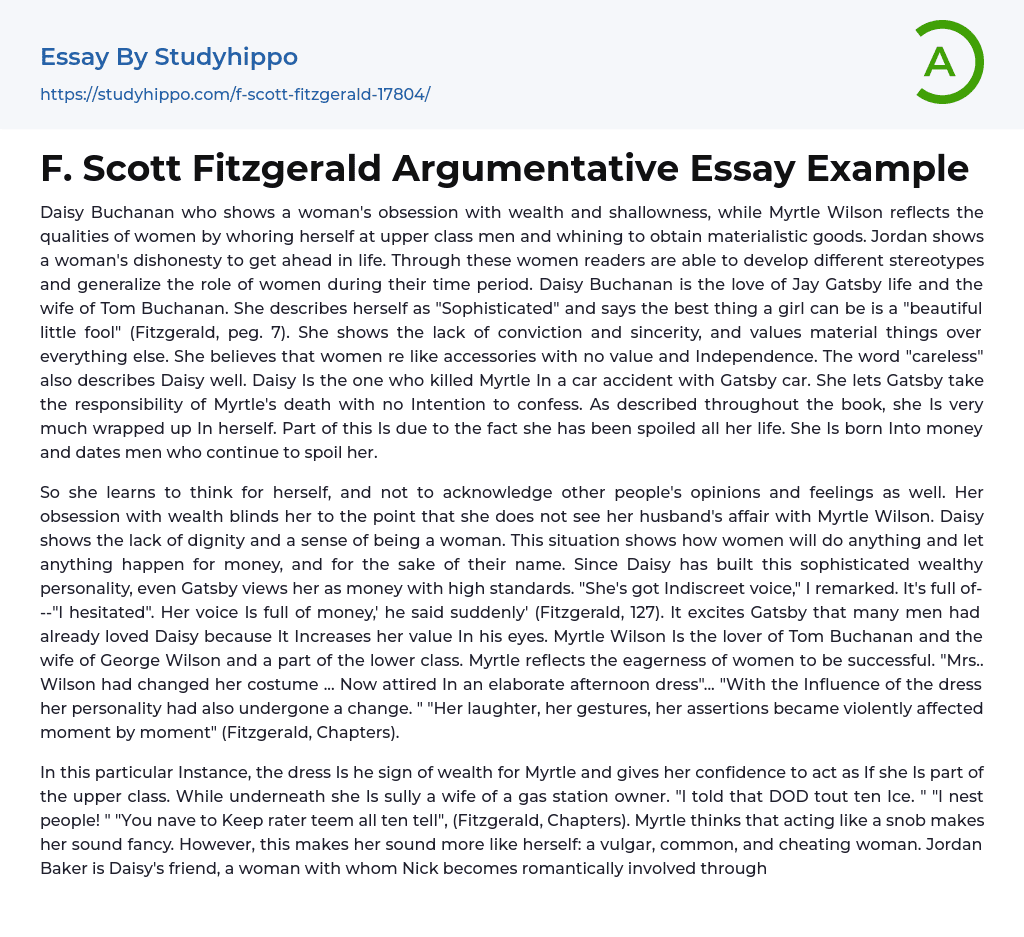The text explores the representation of Daisy Buchanan, Myrtle Wilson, and Jordan as symbols of different stereotypes and roles for women in their time period. Daisy is depicted as materialistic and obsessed with wealth, viewing women as mere accessories without value or independence. She is portrayed as careless and insincere, unaware of her husband's affair with Myrtle Wilson. Despite her privileged background, she selfishly allows Jay Gatsby to take the blame for Myrtle's death without confessing. In contrast, Myrtle is characterized as someone who sells herself to upper-class men and desires material possessions. Jordan exemplifies a woman's dishonesty in her pursuit of success in life. These women provide insight into societal expectations placed on women during that era, revealing how far they are willing to go and what they allow to happen in order to gain money and
...protect their reputation.
Gatsby perceives Daisy as a symbol of wealth and high standards due to her sophistication and affluence: "She's got an indiscreet voice," I commented."It's full of-" I paused."Her voice is full of money," he suddenly interjected (Fitzgerald, 127). Gatsby finds it thrilling that Daisy has been loved by many men in the past because it adds value to her in his perspective. As both Tom Buchanan's lover and George Wilson's wife, Myrtle Wilson belongs to a lower social class but showcases women's eagerness for success.Mrs. Wilson changed her outfit, and now she was wearing a fancy afternoon dress. As she donned the dress, her personality also underwent a transformation. Her laughter, gestures, and statements became increasingly affected with each passing moment (Fitzgerald, Chapters). The dress symbolized wealth for Myrtle and gave her the confidence t
act as if she belonged to the upper class, even though she was married to a gas station owner. "I told that boy about the ice." "I met interesting people!" "You have to keep up appearances and tell them all," (Fitzgerald, Chapters). Myrtle believed that pretending to be snobbish made her seem elegant but only revealed her true self: vulgar, common,and deceitful woman.
Daisy's friend Jordan Baker played golf competitively and was depicted as a selfish, dishonest, and beautiful woman. She was described as being "incurably dishonest"and unable to handle being at a disadvantage. However,the narrator easily forgave her dishonesty because it was seen as a trait in women that shouldn't be heavily condemned.Jordan cheated in her first golf tournament by moving her ball from a bad lie and consistently twisted the truth. Surprisingly, when Nick discovered her deception,it actually pleased him as he felt he had special insight into her character that nobody else possessed
In spite of Jordan's behavior, she favors self-reliance and avoids relying on any man in her life. The novel showcases women treating their men differently, yet a shared theme is their emotional distance from them. These female characters exemplify the evolving roles of women in the 1920s as they pursue independence and contemplate the idea of the American Dream. Conversely, women are also depicted as susceptible and easily controlled by men, willing to go to great lengths to meet the unattainable expectations established by the American Dream.
- Aldous Huxley essays
- Alice Walker essays
- Amy tan essays
- Anne Bradstreet essays
- Anton Chekhov essays
- Arthur Miller essays
- Augustine essays
- Bertolt Brecht essays
- Booker T Washington essays
- Carol ann duffy essays
- Charles Dickens essays
- Charlotte Perkins Gilman essays
- Chinua Achebe essays
- Christina Rossetti essays
- Consider The Lobster essays
- Edgar Allan Poe essays
- Elizabeth Bishop essays
- Emily Dickinson essays
- Ernest Hemingway essays
- F. Scott Fitzgerald essays
- George Orwell essays
- Harper Lee essays
- Homer essays
- James Baldwin essays
- Jane Austen essays
- John Donne essays
- John Steinbeck essays
- Kate Chopin essays
- Kurt Vonnegut essays
- Langston Hughes essays
- Leonardo Da Vinci essays
- Mark Twain essays
- Mary Shelley essays
- Maya Angelou essays
- Nathaniel Hawthorne essays
- Oscar Wilde essays
- Percy Bysshe Shelley essays
- Peter Skrzynecki essays
- Phillis Wheatley essays
- Poets essays
- Ralph Waldo Emerson essays
- Ray Bradbury essays
- Richard Rodriguez essays
- Robert Browning essays
- Robert Frost essays
- Robert Louis Stevenson essays
- Seamus Heaney essays
- Sherman Alexie essays
- Sophocles essays
- Stephen King essays




